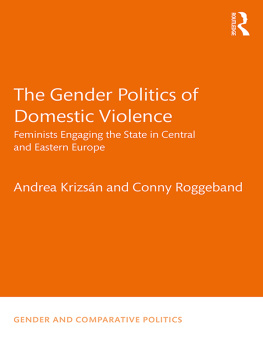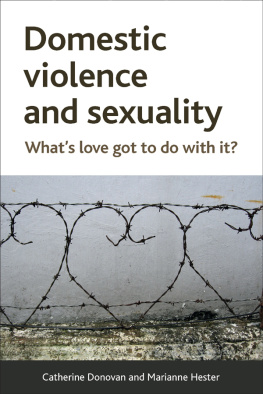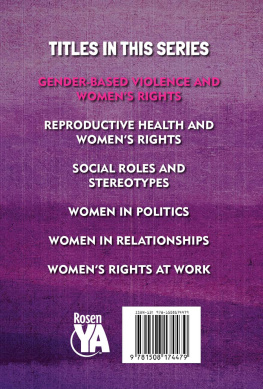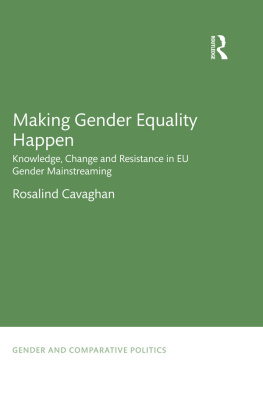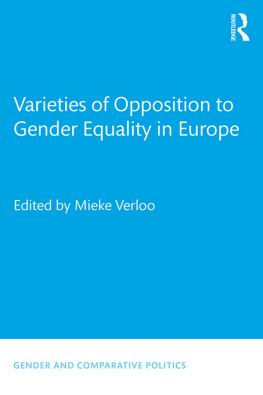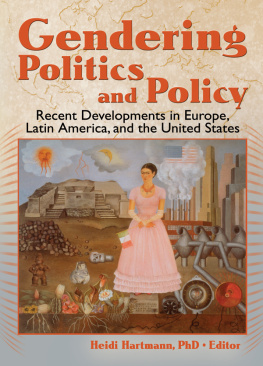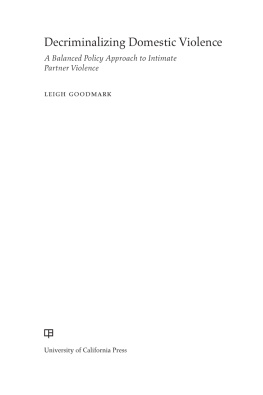Placing violence against women on the global human rights agenda is one of the most impressive successes of the international womens rights movement. By 2015, the overwhelming majority of countries in Central and Eastern Europe that are also currently members of the European Union had adopted laws addressing domestic violence. Yet despite their common origins in state socialism and their exit from it, the authors of this book skillfully show that, twenty-five years after the collapse of the Berlin wall, domestic violence policy in these countries is characterized by major differences. Using interpretive policy analysis, they find the reasons for these differences and their implications for womens rights in the domestic politics of these countries. In doing so, they make a substantial contribution to the literatures on human rights, on violence against women, on gender and politics, and on transitions to democracy.
Sidney Tarrow, author of Power in Movement (2011)
Born of critical frame analysis as one of the heirs of the EU-funded multinational QUING project and nourished with extensive interviews with policy actors and movement activists, this comparative project on Central and East Europe (CEE) matured into a strong book on feminist social action and democratic change. One need not be a scholar of CEE politics to benefit from Krizsn and Roggebands searching analysis of why and how such superficially similar states moved in different directions and how feminist efforts to influence policy in any human rights regime can be ignored, coopted or even sometimes effective. The authors demonstrate that effectiveness is not measured in the number of laws or programs but whether the essential gender connection is drawn to prevent abuse and protect women.
Myra Marx Ferree, Alice H. Cook Professor of Sociology, University of Wisconsin-Madison
The Gender Politics of Domestic Violence
What are the factors that shape domestic violence policy change and how are variable gendered meanings produced in these policies? How and when can feminists influence policy making? What conditions and policy mechanisms lead to progressive change and which ones block it or lead to reversal?
The Gender Politics of Domestic Violence analyzes the emergence of gender equality sensitive domestic violence policy reforms in Central and Eastern Europe (CEE). Tracing policy developments in Bulgaria, Croatia, Hungary, Poland, and Romania from the beginning of 2000s, when domestic violence first emerged on policy agendas, until 2015, Andrea Krizsn and Conny Roggeband look into the contestation that takes place between womens movements, states and actors opposing gender equality to explain the differences in gender equality sensitive policy outputs across the region. They point to regionally specific patterns of feminist engagement with the state in which coalition-building between womens organizations and establishing alliances with different state actors were critical for achieving gendered policy progress. In addition, they demonstrate how discursive contexts, shaped by democratization frames and opposition to gender equality, led to differences in the politicization of gender equality, making gender friendly reforms more feasible in some countries than others.
Andrea Krizsn is a Research Fellow at the Center for Policy Studies, Central European University, Budapest. Her research focuses on the comparative politics of gender inequality and violence against women and intersectionality in Central and Eastern Europe.
Conny Roggeband lectures at the Department of Political Science at the University of Amsterdam. Her research interests include gender mainstreaming and equality policies, gender-based violence, social movements, and transnational feminist networking.
Gender and Comparative Politics
Edited by Karen Celis (Vrije Universiteit Brussel) and Isabelle Engeli (University of Bath)
The comparative research conducted in the field of gender and politics today is more than ever resulting in innovative theory building, applying novel research designs and engaging with mainstream political science. Gender & Politics has moved from the margins of political science to the center. Given the highly critical and activist roots of the gender and politics scholarship, it quasi naturally embraces intersectionality. The Routledge Gender and Comparative Politics book series aims to reflect this rich, critical and broad scholarship covering the main political science sub-disciplines with, for instance, gender focused research on political economy, civil society, citizenship, political participation and representation, governance and policy making.
1. Feminist Activism at War
Belgrade and Zagreb Feminists in the 1990s
Ana Mikovska Kajevska
2. Making Gender Equality Happen
Knowledge, Change and Resistance in EU Gender Mainstreaming
Rosalind Cavaghan
3. The Gender Politics of Domestic Violence
Feminists Engaging the State in Central and Eastern Europe
Andrea Krizsn and Conny Roggeband, with contributions from Raluca Maria Popa
First published 2018
by Routledge
711 Third Avenue, New York, NY 10017
and by Routledge
2 Park Square, Milton Park, Abingdon, Oxon OX14 4RN
Routledge is an imprint of the Taylor & Francis Group, an informa business
2018 Taylor & Francis
The right of Andrea Krizsn and Conny Roggeband to be identified as authors of this work has been asserted by them in accordance with sections 77 and 78 of the Copyright, Designs and Patents Act 1988.
All rights reserved. No part of this book may be reprinted or reproduced or utilised in any form or by any electronic, mechanical, or other means, now known or hereafter invented, including photocopying and recording, or in any information storage or retrieval system, without permission in writing from the publishers.
Trademark notice: Product or corporate names may be trademarks or registered trademarks, and are used only for identification and explanation without intent to infringe.
Library of Congress Cataloging in Publication Data
Names: Krizsn, Andrea, author. | Roggeband, Conny, 1969- author.
Title: The gender politics of domestic violence : feminists engaging the state in Central and Eastern Europe / Andrea Krizsn and Conny Roggeband, with contributions from Raluca Maria Popa.
Description: New York, NY : Routledge, 2018. | Series: Gender and comparative politics ; 3 | Includes bibliographical references and index.
Identifiers: LCCN 2017026638 (print) | LCCN 2017041435 (ebook) | ISBN 9781315618951 (Master) | ISBN 9781317212492 (WebPDF) | ISBN 9781317212485 (ePub) | ISBN 9781317212478 (Mobipocket/ Kindle) | ISBN 9781138667327 (hardback : alk. paper)
Subjects: LCSH: Family violence--Europe. | Family violence--Law and legislation--Europe. | Abused women--Government policy--Europe. | Feminism--Europe.
Classification: LCC HV6626.23.E85 (ebook) | LCC HV6626.23.E85 K75 2018 (print) | DDC 362.82/920943--dc23
LC record available at https://lccn.loc.gov/2017026638
ISBN: 978-1-138-66732-7 (hbk)
ISBN: 978-1-315-61895-1 (ebk)
This book is the product of a long and complicated journey of data gathering, analyzing, sense making and writing. It profited from the fruitful and inspiring insights, support, and collaboration of many nice fellow travelers, and therefore the list of people and institutions we wish to thank is long.

